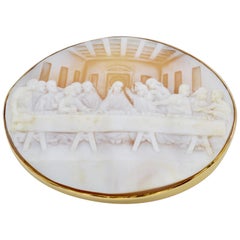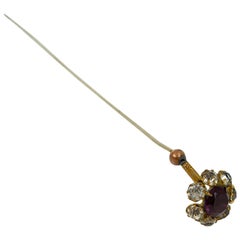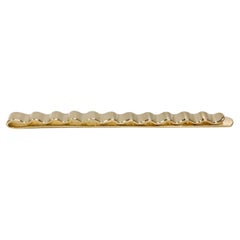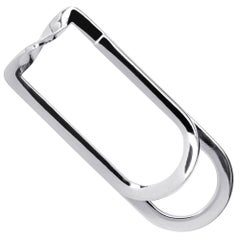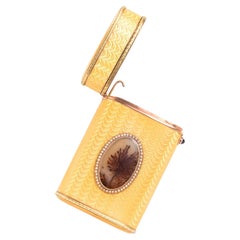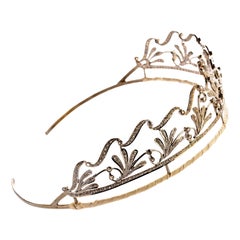Late Victorian More Objets d'Art and Vertu
Also called Aesthetic period jewelry, historians have determined that antique late Victorian jewelry and watches are representative of an era that lasted from about 1880 until 1901 and ushered in the Belle Époque.
Queen Victoria wore her heart on her sleeve, and her emotions were reflected in her fashion and in what we now call Victorian jewelry. By about 1880, Queen Victoria and her constituents were ready to look to the future. The dark skies were parting and fashion was changing. There was also a major shift in industry.
While in the beginning of Queen Victoria’s reign the focus was on manufacturing, toward the later years there was a renewed interest and appreciation of the handmade. The late Victorian period (1880–1901) was referred to as the Aesthetic period and coincided with these changing tastes.
The Aesthetic Movement, concerned with “art for art’s sake,” began in Britain around the 1870s and became recognized by designers and artists worldwide, eventually resulting in the Arts and Crafts movement (1880s–1920s).
Stylistically, jewelry of this time period did not resemble its earlier Victorian counterparts, in fact it was in complete opposition to what preceded it. Gone were the mourning jewelry, heavy brooches and large necklaces. Late Victorian-era jewelry was smaller, lighter and more dainty. Women still layered pieces, though, and favored smaller scatter pins. Jewelry also became an evening accessory and not so visible during the day.
Women were starting to actively participate in sporting events (socially, of course, not professionally), so athletic motifs showed up on their accessories. Lockets and heart pendants remained popular, but the REGARD or DEAREST rings of the early Victorian period were replaced by Mizpah pieces, which means “the Lord watches over me” in Hebrew. These items were exchanged between two people to symbolize a close bond.
Diamonds came into fashion, and semiprecious gems such as amethysts and opals became prevalent, too. Using gemstones for their natural beauty and not their worth was something that jewelers of the Aesthetics movement felt passionate about, and this ideology would really become relevant in Art Nouveau jewelry.
The Brits still looked to their monarchs to dictate the latest trends. Queen Victoria’s daughter-in-law Alexandra famously wore a dog-collar necklace, also known as a collier de chien, made up of multiple strands of pearls, to hide a scar. This style of necklace quickly rose to prominence. Toward the end of the 19th century, solitaire rings were also becoming fashionable thanks to Tiffany & Co.’s advent of the six-prong diamond setting in 1886. Platinum was starting to be used in jewelry production as well. Edwardian and, afterward, Art Deco engagement rings that followed in the wake of Queen Victoria’s death in 1901 would be characterized by complex geometric designs and platinum settings.
Women were the biggest influences on jewelry. They joined the workforce, fought for their independence and overall began to lead a much more active lifestyle. Jewelry had to become comfortable and serve multiple purposes. While in the United States, the Gibson Girls lifestyle was emulated by young women, and starlets became trendsetters.
Finally, the international expositions made the world seem like a much smaller place and jewelry from North Africa and India captured people’s attention, appealing to those who already favored Revival jewelry from the Etruscans to the Romans.
Find antique late Victorian jewelry and watches on 1stDibs.
Early 1800s American Antique Late Victorian More Objets d'Art and Vertu
14k Gold
Early 1900s Unknown Antique Late Victorian More Objets d'Art and Vertu
Crystal, Brass
1990s Unknown Late Victorian More Objets d'Art and Vertu
Gold, 14k Gold, Yellow Gold
21st Century and Contemporary Italian Late Victorian More Objets d'Art and Vertu
Silver, Sterling Silver
1970s Vintage Late Victorian More Objets d'Art and Vertu
Yellow Gold
1990s Italian Late Victorian More Objets d'Art and Vertu
Sterling Silver
1980s American Vintage Late Victorian More Objets d'Art and Vertu
Gold Plate
2010s British Late Victorian More Objets d'Art and Vertu
Sterling Silver
1950s American Vintage Late Victorian More Objets d'Art and Vertu
Turquoise, Sterling Silver
1950s American Vintage Late Victorian More Objets d'Art and Vertu
Turquoise, 14k Gold
2010s Greek Late Victorian More Objets d'Art and Vertu
Brown Diamond, Ruby, Yellow Gold, 18k Gold
21st Century and Contemporary Italian Late Victorian More Objets d'Art and Vertu
Sterling Silver
1960s Vintage Late Victorian More Objets d'Art and Vertu
Mid-20th Century Late Victorian More Objets d'Art and Vertu
Silver
1890s Russian Antique Late Victorian More Objets d'Art and Vertu
Agate, Pearl, Sapphire, Blue Sapphire, Gold, White Gold, Yellow Gold, En...
2010s Indian Late Victorian More Objets d'Art and Vertu
Diamond, Silver
1890s Unknown Antique Late Victorian More Objets d'Art and Vertu
Crystal, Silver
1890s French Antique Late Victorian More Objets d'Art and Vertu
Brass
Early 1800s American Antique Late Victorian More Objets d'Art and Vertu
14k Gold
Late 19th Century French Antique Late Victorian More Objets d'Art and Vertu
18k Gold
1890s British Antique Late Victorian More Objets d'Art and Vertu
Yellow Gold
Late 20th Century English Late Victorian More Objets d'Art and Vertu
Sterling Silver
1890s English Antique Late Victorian More Objets d'Art and Vertu
Carnelian, 9k Gold
Late 19th Century Italian Antique Late Victorian More Objets d'Art and Vertu
9k Gold, Yellow Gold
